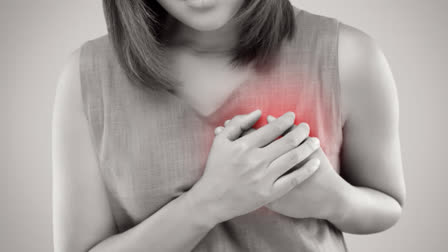Prague [Czech Republic]: According to findings presented at Heart Failure 2023, a scientific congress of the European Society of Cardiology (ESC), women are more than twice as likely as males to die following a heart attack. "Women of all ages who experience a myocardial infarction are at particularly high risk of a poor prognosis," said study author Dr Mariana Martinho of Hospital Garcia de Orta, Almada, Portugal.
"These women need regular monitoring after their heart event, with strict control of blood pressure, cholesterol levels and diabetes, and referral to cardiac rehabilitation. Smoking levels are rising in young women and this should be tackled, along with promoting physical activity and healthy living."
Previous studies have found that women with ST-elevation myocardial infarction (STEMI) have a worse prognosis during their hospital stay compared to men, and that this may be due to their older age, increased numbers of other conditions, and less use of stents (percutaneous coronary intervention; PCI) to open blocked arteries.2 This study compared short- and long-term outcomes after STEMI in women and men, and examined whether any sex differences were apparent in both premenopausal (55 years and under) and postmenopausal (over 55) women.
This was a retrospective observational study which enrolled consecutive patients admitted with STEMI and treated with PCI within 48 hours of symptom onset between 2010 and 2015. Adverse outcomes were defined as 30-day all-cause mortality, five-year all-cause mortality and five-year major adverse cardiovascular events (MACE; a composite of all-cause death, reinfarction, hospitalisation for heart failure and ischaemic stroke).
The study included 884 patients. The average age was 62 years and 27% were women. Women were older than men (average age 67 vs. 60 years) and had higher rates of high blood pressure, diabetes and prior stroke. Men were more likely to be smokers and have coronary artery disease. The interval between symptoms and treatment with PCI did not differ between women and men overall, but women aged 55 and below had a significantly longer treatment delay after arriving at the hospital than their male peers (95 vs. 80 minutes).
Also read:Data from wearables might be a boon to mental health diagnosis: Study
The researchers compared the risk of adverse outcomes between women and men after adjusting for factors that could influence the relationship including diabetes, high cholesterol, hypertension, coronary artery disease, heart failure, chronic kidney disease, peripheral artery disease, stroke and family history of coronary artery disease. At 30 days, 11.8% of women had died compared to 4.6% of men, for a hazard ratio (HR) of 2.76. At five years, nearly one-third of women (32.1%) had died versus 16.9% of men (HR 2.33). More than one-third of women (34.2%) experienced MACE within five years compared with 19.8% of men (HR 2.10).
Dr. Martinho said: "Women had a two to three times higher likelihood of adverse outcomes than men in the short- and long-term even after adjusting for other conditions and despite receiving PCI within the same timeframe as men." The researchers conducted a further analysis in which they matched men and women according to risk factors for cardiovascular disease including hypertension, diabetes, high cholesterol and smoking.
Adverse outcomes were then compared between matched men and women aged 55 years and under, and between matched men and women over 55 years old. There were 435 patients in the matched analysis. In matched patients over 55 years of age, all adverse outcomes measured were more common in women than men.
Some 11.3% of women died within 30 days compared with 3.0% of men, for an HR of 3.85. At five years, one-third of women (32.9%) had died compared with 15.8% of men (HR 2.35) and more than one-third of women (34.1%) had experienced MACE compared with 17.6% of men (HR 2.15). In matched patients aged 55 years and below, one in five women (20.0%) experienced MACE within five years compared to 5.8% of men (HR 3.91), while there were no differences between women and men in all-cause mortality at 30 days or five years.
Dr. Martinho said: "Postmenopausal women had worse short- and long-term outcomes after myocardial infarction than men of similar age. Premenopausal women had similar short-term mortality but a poorer prognosis in the long-term compared with their male counterparts. While our study did not examine the reasons for these differences, atypical symptoms of myocardial infarction in women and genetic predisposition may play a role. We did not find any differences in the use of medications to lower blood pressure or lipid levels between women and men."
She concluded: "The findings are another reminder of the need for greater awareness of the risks of heart disease in women. More research is required to understand why there is gender disparity in prognosis after myocardial infarction so that steps can be taken to close the gap in outcomes." (ANI)
